14-01
God Led Israel [14-01]
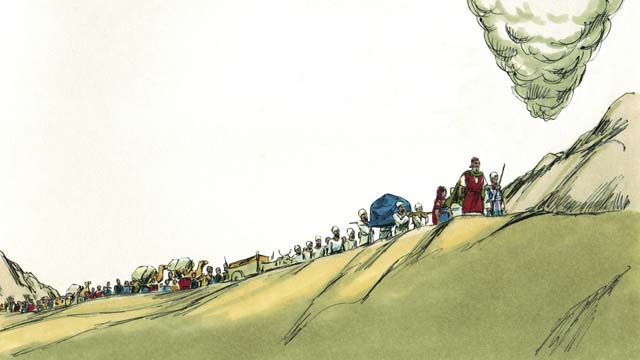
After God had told the Israelites the laws he wanted them to obey as part of his covenant with them, they left Mount Sinai. God began leading them from toward the Promised Land, which was also called Canaan. The pillar of cloud went ahead of them towards Canaan and they followed it.
以色列人在西奈山得到了神的约之后,神继续引领他们到向应许之地,那地又叫迦南。云柱指引他们前进的方向。
Important Terms:
Translation Notes:
- pillar of cloud - See how you translated this phrase in [[:zh:obs:notes:frames:12-02|[12-02]]].
14-02
The Canaanites' Idols [14-02]
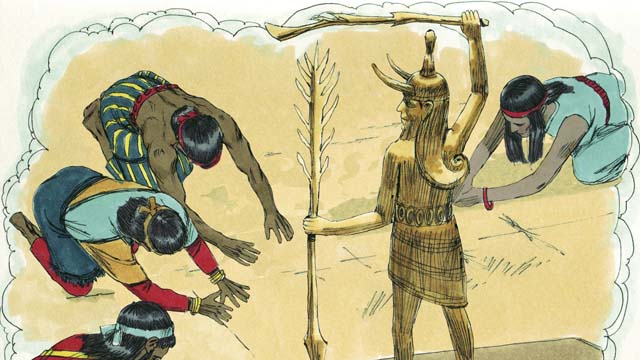
God had promised Abraham, Isaac, and Jacob that he would give the Promised Land to their descendants, but now there were many people groups living there. They were called Canaanites. The Canaanites did not worship or obey God. They worshiped false gods and did many evil things.
神曾向亚伯拉罕,以撒,雅各应许赐给他们后代一块应许之地,但是那地住了许多其他部落的人。他们被称作迦南人。迦南人不信神。他们敬拜假神,且作了很多恶事。
Important Terms:
- God
- promise
- Abraham
- Isaac
- Jacob
- PromisedLand
- descendant
- peoplegroup
- Canaan
- worship
- obey
- falsegod
- evil
Translation Notes:
(There are no notes for this frame.)
14-03
Destroy the Canaanites [14-03]
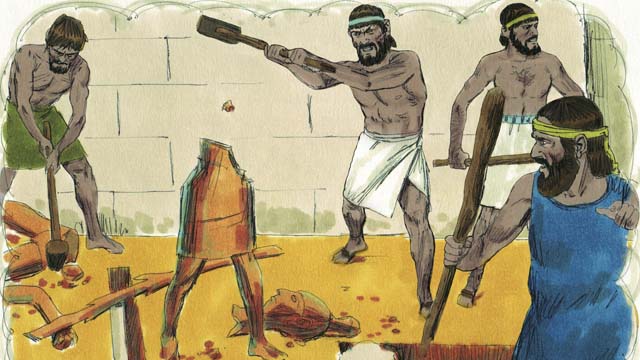
God told the Israelites, “You must get rid of all the Canaanites in the Promised Land. Do not make peace with them and do not marry them. You must completely destroy all of their idols. If you do not obey me, you will worship their idols instead of me.”
神告诉以色列人,“你必要除灭这地上的迦南人。不要和他们交好,也不要与他们婚配。你们必要彻底摧毁他们所有的偶像。如果你们不这么做,就会去敬拜他们的偶像,而不是敬拜我。”
Important Terms:
Translation Notes:
- get rid of - This could be translated as, "get them out of the land" or, "remove them from the land."
- Do not make peace with them - This could be translated as, "Do not live peacefully among or alongside them" or, "Do not promise to live peacefully with them."
- do not marry them - God did not want any Israelite person to marry any Canaanite person.
- you will worship their idols - If the Israelites became friends with the Canaanites and did not destroy the idols, they would be tempted to worship those idols instead of God. You could say, "you will end up worshiping" to make it clear that this would result from living so close to the Canaanites and learning their ways.
14-04
The Twelve Spies [14-04]
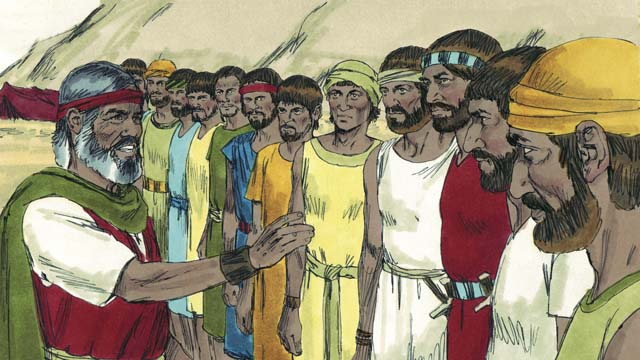
When the Israelites reached the border of Canaan, Moses chose twelve men, one from each tribe of Israel. He gave the men instructions to go and spy on the land to see what it was like. They were also to spy on the Canaanites to see if they were strong or weak.
以色列人到达迦南边境后,摩西从十二个支派中各选出一个人。他指示这些人去窥探那地的情形。他们也去窥探那地的迦南人是强壮还是瘦弱。
Important Terms:
Translation Notes:
- spy on the land - This could be translated as, "secretly get information about the land" or, "secretly learn about the land." Part of the spies' task was to find out what kinds of food the land could produce.
- spy on the Canaanites - This could be translated as, "secretly get information about the people of Canaan" or, "secretly learn about the Canaanites."
- to see if they were strong or weak - They wanted to know if the Canaanites were prepared to fight against them. This could be translated as, "to find out how powerful the Canaanite armies were."
14-05
The Bad Report [14-05]
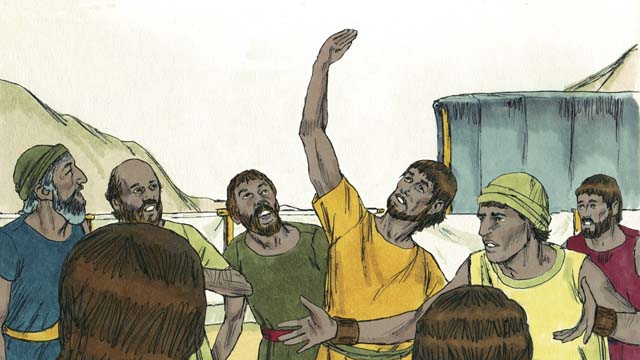
The twelve men traveled through Canaan for forty days and then they came back. They told the people, “The land is very fertile and the crops are plentiful!” But ten of the spies said, “The cities are very strong and the people are giants! If we attack them, they will certainly defeat us and kill us!”
四十天后之后,这些人回来了。十个探子报告了坏消息,说,“那地是很好的,出产也极丰盛!但那城非常坚固,人也非常巨大!如果攻击他们,我们必死!”
Important Terms:
Translation Notes:
- they came back - They returned to where the rest of the Israelites were waiting, just outside the border of Canaan.
- The cities are very strong - The cities had strong walls around them, so it would be very difficult for the Israelites to attack them.
- the people are giants – This could be translated as, "the people are like giants compared to us!" or, "the people are much taller and stronger than we are!"
14-06
Joshua and Caleb [14-06]
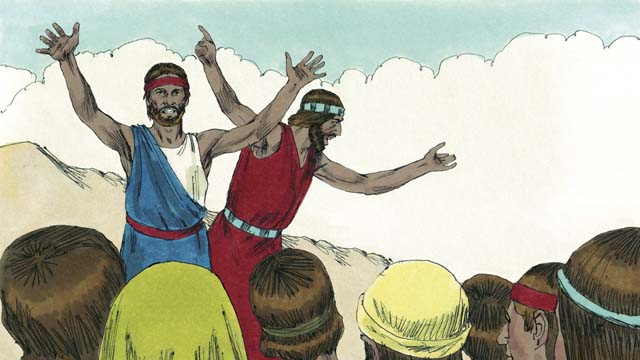
Immediately Caleb and Joshua, the other two spies, said, “It is true that the people of Canaan are tall and strong, but we can certainly defeat them! God will fight for us!”
另两个探子,迦勒和约书亚,立刻说道,“那地的人确实又高又壮,但是我们能击败他们!神会为我们而战!”
Important Terms:
Translation Notes:
- people of Canaan – This could be translated as, "the people who live in Canaan" or, "the Canaanites."
- we can certainly defeat them! God will fight for us – To show the connection between these two statements, it may be necessary to say, "we can certainly defeat them because God will fight for us!"
- God will fight for us – This could be translated as, "God will fight alongside us and help us defeat them!" This makes it clear that the Israelites would also be fighting against the Canaanites.
14-07
The People Rebelled [14-07]
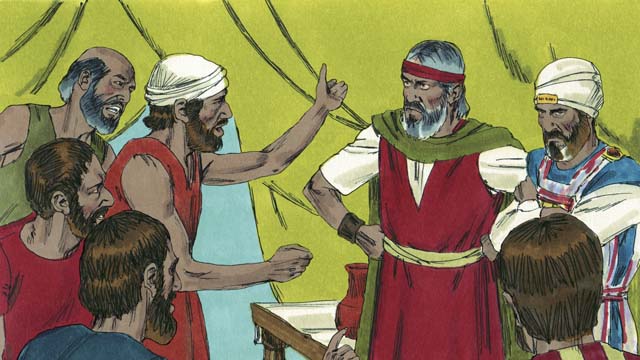
But the people did not listen to Caleb and Joshua. They became angry with Moses and Aaron and said, “Why did you bring us to this horrible place? We should have stayed in Egypt rather than be killed in battle and our wives and children made slaves.” The people wanted to choose a different leader to take them back to Egypt.
以色列人恼怒摩西和亚伦,说,“你们为什么把我们带到这个可怕的地方?我们应该呆在埃及地,而不是在战场上被杀死,使我们的妻子儿女沦为奴隶。”百姓想要杀掉他们,然后选出新的领导人带领他们回到埃及。
Important Terms:
Translation Notes:
- Why did you bring us – This is not a real question. It is a way that some languages use to say, "You should not have brought us."
- this horrible place - They considered Canaan to be "horrible" because they thought it was so dangerous that they would all be killed.
- rather than be killed in battle and our wives and children made slaves - This could be translated as, "If we fight against the Canaanites, they will kill us men and force our wives and children to be their slaves."
14-08
God Spoke [14-08]
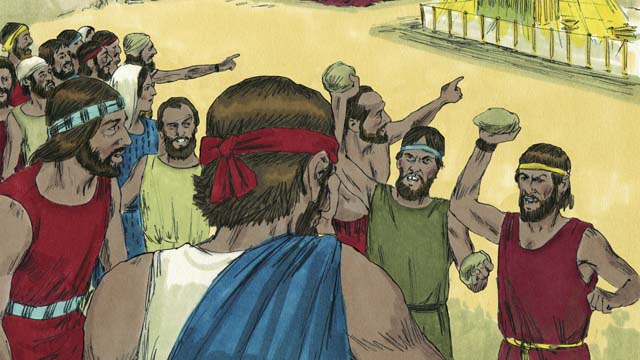
God was very angry and came to the Tent of Meeting. God said, “Because you have rebelled against me, all of the people will have to wander in the wilderness. Except for Joshua and Caleb, everyone who is twenty years or older will die there and never enter the Promised Land.”
神很生气,他在会幕显现。神说,“除了约书亚和迦勒,所有二十岁及以上的人都要在旷野游荡,直到他们死去。他们永远也不会进到应许之地。”
Important Terms:
Translation Notes:
- came to - God did not appear as a person, but came in some other form that showed his glory and power.
- wander in the wilderness - God would lead the people around in the wilderness with no specific destination until all of the adults who rebelled against him died.
14-09
The People Ignored God [14-09]
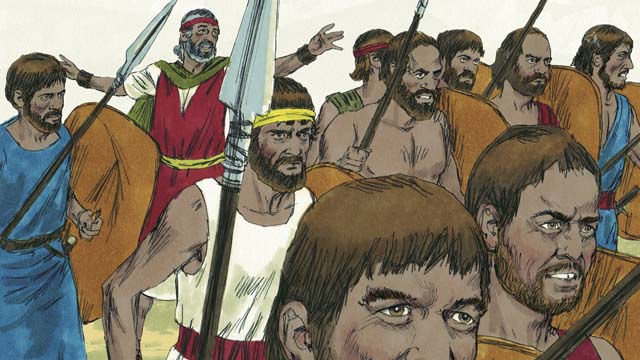
When the people heard this, they were sorry they had sinned. They took their weapons and went to attack the people of Canaan. Moses warned them not to go because God was not with them, but they did not listen to him.
百姓听到这些后,为他们犯的罪悔恨。他们就带上武器去攻打迦南地。摩西警告他们不要去,因为神没有与他们同在,但他们不听摩西。
Important Terms:
Translation Notes:
- they had sinned - It may be necessary to add, "they had sinned by disobeying God's command to conquer the peoples of Canaan."
- Moses warned them not to go - This means that Moses told them not to go to fight against the Canaanites because they would be in danger if they did that.
- God was not with them – In other words, God would not be with them to help them. Because of the Israelites' disobedience, God withdrew from them his presence, protection, and power.
- but they did not listen to him - They did not obey Moses. They went to attack the Canaanites anyway.
14-10
The Canaanites Defeated Israel [14-10]
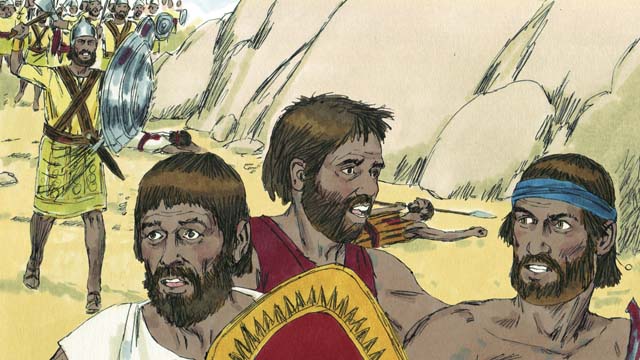
God did not go with them into this battle, so they were defeated and many of them were killed. Then the Israelites turned back from Canaan and wandered through the wilderness for forty years.
在这场战役中神没有与他们同在,所以他们被打败了,并且很多人被杀了。剩下的以色列人从迦南地退回并且在旷野游荡了四十年。
Important Terms:
Translation Notes:
- God did not go with them into this battle - In other words, God did not help them in this fight.
- turned back from Canaan - They left Canaan and went back into the wilderness where they were before.
- wandered through the wilderness - They lived in the wilderness, and together they moved from place to place in that large, dry land, looking for food and water for themselves and their animals.
14-11
Manna from Heaven [14-11]
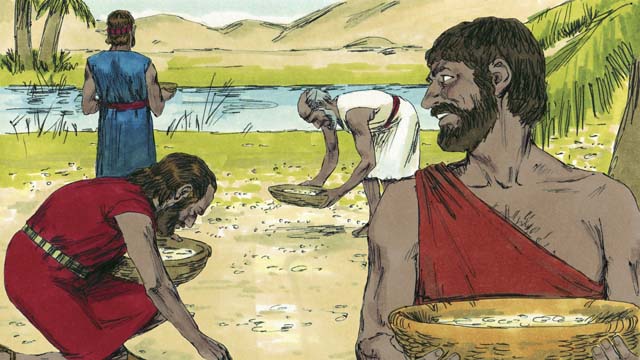
During the forty years that the people of Israel wandered in the wilderness, God provided for them. He gave them bread from heaven, called “manna”. He also sent flocks of quail (which are medium-sized birds) into their camp so they could have meat to eat. During all that time, God kept their clothes and shoes from wearing out.
在旷野游荡的日子里,神供给他们。他给他们从天上来的饼,叫“吗哪”。他也送来了鹌鹑到他们的帐篷前,使得他们有肉吃。在那四十年里,神保守他们的衣服和鞋子不会被穿坏。
Important Terms:
Translation Notes:
- God provided for them – This could be translated as, "God gave them everything they needed for food, water, and shelter."
- bread from heaven, called "manna" - This thin, bread-like food fell from the sky overnight onto the grass like dew. They called it "manna." Almost every day the people gathered this "manna" and cooked it as their food.
- He also sent flocks of quail…camp - Another way to say this would be, "He also caused a large number of quails to fly into their camp." If quails are unknown, a different, similar type bird could be used. Or it could be translated as, "a large number of medium-sized birds."
- their camp - The place where the Israelites set up their tents to sleep in was called a "camp." It was like a city with tents instead of buildings, and it could be moved around.
14-12
Water from a Rock [14-12]
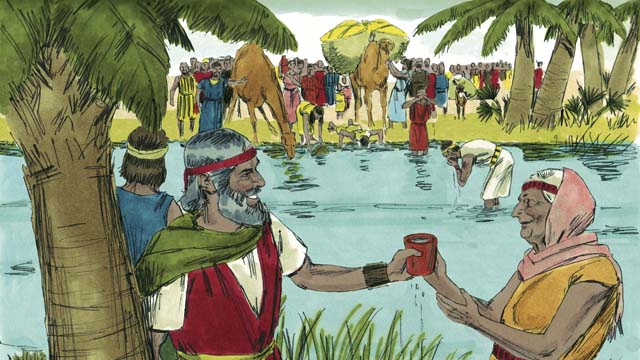
God even miraculously gave them water from a rock. But despite all this, the people of Israel complained and grumbled against God and against Moses. Even so, God was still faithful to his promises to Abraham, Isaac, and Jacob.
神甚至奇迹般的从岩石中变出水来。但即使这样,以色列民仍然抱怨神和摩西。神却仍持守他和亚伯拉罕,以撒,雅各的约。
Important Terms:
Translation Notes:
- miraculously gave them water from a rock - This could be translated, "by doing something that only God can do, he made water pour out of a rock so the people and animals could drink."
- But despite all this - This could be translated as, "But even though God provided food, water, clothing, and everything that they needed."
- Even so - This could be translated, "Even though the Israelites complained and grumbled against him."
- God was still faithful to his promises - This could be translated, "God continued to do what he had told Abraham, Isaac, and Jacob he would do." He provided their descendants with what they needed so they that could live and become a great nation and eventually own the land of Canaan.
14-13
Moses Struck the Rock [14-13]
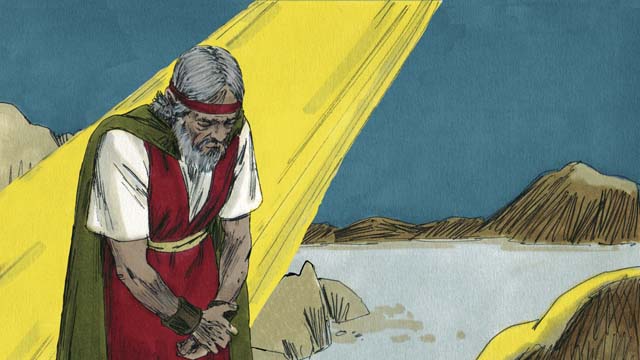
Another time when the people did not have any water, God told Moses, “Speak to the rock, and water will come out of it.” But Moses dishonored God in front of all the people by hitting the rock twice with a stick instead of speaking to it. Water came out of the rock for everyone to drink, but God was angry with Moses and said, “You will not enter the Promised Land.”
有一次,人们没有水了,神告诉摩西,“对石头说话,水就会出来。”但是摩西违背了神,他当着人们的面用棍子击打了两次岩石,而不是对岩石说话。岩石流出了水让人们喝。但是神对摩西发怒,说,“你必不得进入应许之地。”
Important Terms:
Translation Notes:
- Moses dishonored God - This could be translated, "Moses disobeyed God" or, "Moses disrespected God." God had a specific way He wanted Moses to show the people God's power to provide for them. When Moses disobeyed God by doing it in a different way he showed a lack of respect for God.
- by hitting the rock twice with a stick instead of speaking to it - This can be translated as, "Moses did not speak to the rock; he hit it twice with a stick."
14-14
At the Promised Land [14-14]
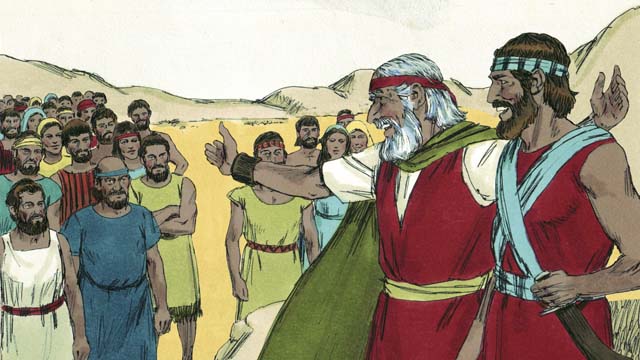
After the Israelites had wandered in the wilderness for forty years, all of them who had rebelled against God were dead. Then God led the people to the edge of the Promised Land again. Moses was now very old, so God chose Joshua to help him lead the people. God also promised Moses that one day, he would send another prophet like Moses.
游荡四十年之后,所有悖逆神的人都死了。神便带领以色列民又来到应许之地的边境。摩西已经非常老了,他便选了约书亚帮助他带领百姓。神应许摩西将兴起另一位像他一样的先知。
Important Terms:
Translation Notes:
- who had rebelled against God - This could be translated, "who had refused to obey God when he told them to go into the Promised Land."
- the people - That is, the children of the generation that died.
- one day - This means, "some time in the future."
- another prophet like Moses - Like Moses, this man would be an Israelite, he would speak God's words to the people, and he would lead the people.
14-15
The Death of Moses [14-15]
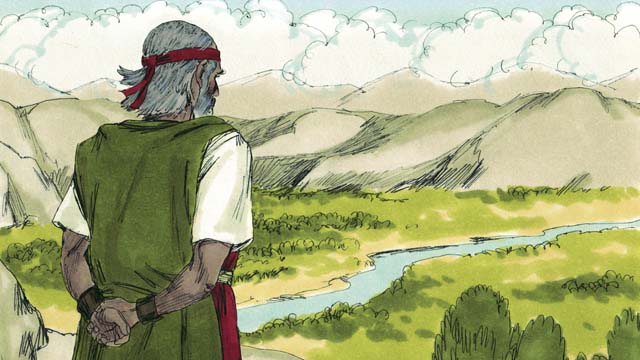
Then God told Moses to go to the top of a mountain so he could see the Promised Land. Moses saw the Promised Land but God did not permit him to enter it. Then Moses died, and the Israelites mourned for thirty days. Joshua became their new leader. Joshua was a good leader because he trusted and obeyed God.
神把摩西带到了山顶,使他能看到应许之地。摩西看到了,但却进不去。不久,摩西死了,以色列人哀哭三十天。约书亚成为了他们新的领导人。约书亚是一个好的首领,因为他全心信靠神。
Important Terms:
Translation Notes:
- mourned for thirty days - For thirty days all the people of Israel cried and showed that they were very sad that Moses had died.
- A Bible story from - These references may be slightly different in some Bible translations.
